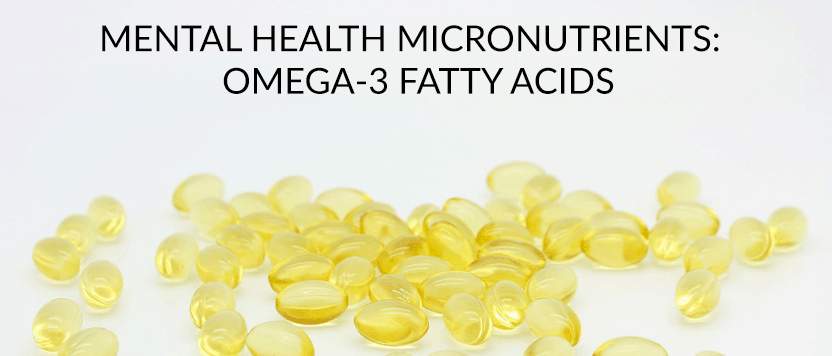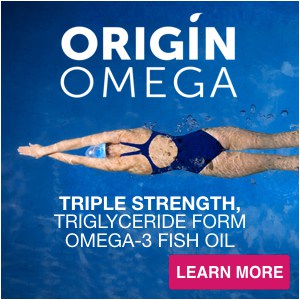Have you ever heard the claim that fish is “brain food?” This common knowledge is reinforced in multiple cultures and traditions all over the world, from Mira’s college roommate who ate sushi every day on finals week to the cook at a local Mexican restaurant who swears by her caldo de mares as “memory food.”
All this fuss about fish is for fantastic reasons. Simply put, fish do a lot of work to keep their cell membranes fluid and inflammation at bay in the challenging environments they inhabit. Sitting comfortably at the top of the food chain, we can use their chemical strength to our advantage. Nutrition scientists have shown since the 1990s that fish consumption might reduce serotonin-related depression because low concentrations of the omega-3 fatty acid DHA can predict low levels of HIAA, an organic acid used to measure serotonin turnover.
What else can fishy fats do for you? And what if you dislike seafood? Are you concerned about metal toxicity with seafood or supplementation? With all of the buzz about omega-3 fatty acids in fish like salmon and sardines reducing inflammation, could they play a role in the support of depression and other mental health challenges? Most importantly, how can you use this information to your benefit?
Building a Better Brain
Technically speaking, omega-3s comprise a fatty acid family in which you can find the first carbon-carbon double-bond (an omega bond) between the third and fourth carbon. In this post, we will focus on two brain-boosting long-chain omega-3 fatty acids found in most seafood: DHA (docosahexaenoic acid) and EPA (eicosapentaenoic acid). EPA and DHA both support blood flow to your brain and the blood brain barrier. They help regulate brain-derived neurotrophic factor (BDNF) and insulin-like growth factor 1 (IGF-1), which are important for strengthening synapses (spaces between brain cells) and sending messages across them. They have even been shown to help regrow blood vessels in the brain after stroke!
DHA has several brain-building and synapse-supporting effects. Highly concentrated in your brain and retinas, DHA helps brain cells grow, connect with other cells, serve specialized functions, and repair their membranes. Animal research suggests that a fetus gets DHA for brain development from its mother, which can protect against brain damage from too much oxygen, too little oxygen, and oxidative stress. A developing infant brain takes up DHA from its mother through the placenta between the last trimester and the first 6-10 months after birth, so DHA in a mother-to-be’s diet- and then in breast milk or formula- is very important. Breast milk with lower DHA levels has been correlated with eating less seafood and a higher risk of post-partum depression across multiple countries.
As we age, DHA is still important: in a study of 208 healthy 30 to 54 year-olds, serum DHA correlated with improved performance on memory, vocabulary, and reasoning tests. In a study on mice, adolescents raised with omega-3 deficiency from infancy had weaker memory and explored their surroundings less. Neuroprotectin D1, a chemical made from DHA, may improve brain survival and repair as you age by reducing inflammation and increasing brain cell growth. In addition to brain maintenance, DHA appears to reduce the likelihood of macular degeneration, Alzheimer’s disease, and other age-related brain disorders.
EPA appears to support brain health by reducing inflammation. A 2:1 ratio of EPA to DHA has been shown to reduce chronic inflammation. Chronic Inflammation is a process often correlated with depression, and recent research hints that a chronic inflammatory state may drive depression to redirect a body’s resources toward healing. Because normal aging reduces our capacity to reduce inflammation, omega-3s should help reduce the damage caused by age-related brain degeneration.
Omega-3s in general have been shown to give humans a learning and memory boost. In a study of young adults, 6 months of omega-3 supplementation (750 mg DHA with 930 mg EPA) improved working memory. A study of 86 older adults with an average age of 71 associated omega-3 supplementation with improved perceptual speed and spatial imagery processing; men also experienced improved working memory and general cognition.
Stressing the Connections
Although today we are focused on mind and mood, consider the superhero-like effects of omega-3 fatty acids on health concerns linked to chronic stress. While omega-3s seem to help regulate our stress response in our brain and adrenal glands, these phenomenal fats have many ways to support your support systems, including boosting immunity, reducing blood pressure and triglycerides, quelling inflammation in several animals and tissue types like the large intestine, and smoothing out a rough menstrual cycle.
If you reduce inflammation and build better cell membranes, you support all tissues- brain included- because cells can import, export, and communicate better. In fact, many psychiatric disorders have neuroinflammation (brainflammation) in common, which may explain why omega-3s reduce both neuroinflammation and disease symptoms in many animal models including spinal cord injury, Alzheimer’s and Parkinson’s disease, depression, ALS, and more. Free radical damage to cell membranes depletes omega-3 levels, reducing membrane integrity, so replacing those fatty acids is a rational approach to reduce disease risk. Research shows that when DHA is lacking, omega-6 fatty acids replace missing DHA, and function suffers. In cells whose main job is to communicate, membranes are critical.
Mind, Mood, and Making Mental Machinery: Depression and Beyond
Some forms of depression are linked to low serotonin and low dopamine levels, both of which are associated with omega-3 fatty acid deficiency: Low serotonin is associated with anti-social behavior, uncontrolled aggressive behavior, and self-injury. According to brain development expert Dr. Bruce Ames, EPA and DHA team up with Vitamin D to maintain healthy serotonin levels in your brain. Vitamin D controls how much serotonin you make, then EPA affects releasing serotonin into synapses, and DHA improves membrane fluidity, helping serotonin receptors get the message. (Learn more about Vitamin D here.)
- Post-Traumatic Stress Disorder. Newer research in PTSD is promising! A 2017 study of 83 Japanese accident survivors with mild PTSD symptoms were given omega-3s within 10 days of the accident. After 12 weeks of supplemention (DHA greater than EPA), heart rate decreased both at rest and in response to script-driven imagery more in the omega-3 group than the control group. A study of 110 subjects with severe physical injury were given 12 weeks of omega 3 supplementation (EPA 1470 mg and DHA 147 mg). Despite the lower DHA levels, red blood cell membranes increased EPA concentrations and subjects showed significant improvement. Similarly, a 2011 study of 172 disaster medical assistance team workers for the Great East Japan Earthquake were given a 70% DHA to 7% EPA omega-3 supplement for 14 weeks: women benefited but men did not. Considering that it can take up to 12 weeks to incorporate DHA fully into cell membranes, it is impressive that effects can be seen so quickly.
- Depression. Omega-3 status has been inversely correlated with depressive symptoms in several studies. Generally, the evidence is strongest for bipolar depression. EPA seems to have a stronger anti-depressant effect than DHA, which fits well with other research indicating therapies that reduce inflammation can also reduce depression. A 2016 review of 35 research trials involving over 10,000 participants reinforced that EPA-dominant omega-3 supplements had more of an antidepressant effect. EPA has even been shown, in smaller studies, to work better with Prozac than EPA or Prozac alone for generalized depression. Another small study with major depressive disorder patients concluded that EPA plus standard antidepressant therapy showed significant benefits by week 3 of treatment- improved sleep, mood, and less feelings of worthlessness. Patients with major depressive disorder. Even women with post-partum depression have been shown in several studies to benefit from both EPA alone and EPA:DHA supplementation. Especially during the critical post-partum period, the importance of safe and effective methods for improving mental quality of life cannot be understated.
- Schizophrenia. Research indicates that people with both depression and schizophrenia have less omega-3 fatty acids in their red blood cell membranes than controls, and that omega-3 supplementation can reduce the likelihood of those with threshold psychosis progressing to a true psychotic disorder! In fact, both low B12 (see our post on the importance of B12 and methylation for mental health and more) and low DHA are usually observed in schizophrenic patients. A small study of 71 patients aged 16 to 35 years old demonstrated that after 6 months of omega-3 supplementation, symptom severity decreased by 50% in the treatment group!
- Alzheimer’s Disease and Dementia. As mentioned above, DHA plays a primary role in building a better baby brain and protecting it from age-related damage. In older adults, omega-3 supplementation appears to slow progression of neurodegenerative disease. For example, one study of 174 Alzheimer’s patients of average age 74 were given 2.3 grams of omega-3s or placebo for 6 months and then assessed for cognitive functioning. The higher plasma omega-3 levels were, the lower the rate of cognitive decline.
Living an Omega-3 Rich Lifestyle
FOOD : If you enjoy eating seafood, choose clean sources high in Omega-3 fatty acids EPA and DHA.
- Fatty Fish. Salmon, mackerel, cod liver oil, herring, sardines, anchovies, caviar, bluefish, capelin, sablefish, and tuna are great sources.
- Because fish and other sea creatures produce omega-3s to keep their membranes fluid in cold waters, fish like salmon that survive more frigid temperatures tend to have higher levels.
- When you choose fish, choose smaller fish (e.g. Spanish mackerel instead of king mackerel) to reduce your likelihood of metal toxicity and increase the concentration of the fats you want. For example, choose chunk light tuna instead of albacore or Spanish mackerel instead of king.
- Crustaceans and Bivalves. Oysters, clams, conchs, lobster, shrimp, and crab have the same omega-3 content as lower omega-3 content fish. While the amount is noteworthy compared to other foods, choose fatty fish listed above for the highest density of omega-3 per serving. Filter-feeders like oysters tend to concentrate minerals, so they can both be high in zinc and iron but also high in heavy metals.
- Plant Sources? Alpha linolenic acid (ALA), an omega-3 fatty acid found in flax seeds, chia seeds, and walnuts, is touted by many vegans as a replacement for the omega-3 fatty acids found in seafood. While DHA supplements sourced from algae are a great source of one critical omega-3, ALA is not a great source of omega-3 fats. The average person converts a small amount of ALA- about 3%- to usable omega-3s. Supplementation is warranted for those who do not consume fish.
LIFESTYLE – Improve your ability to digest and assimilate fats while supporting mental health by reducing stress.
- Calm yourself to boost protein digestion. The more you rest, the better you digest. One important reason for this is that you produce more robust stomach acid when you are focused on your food. Eating proteins like fish require acid to break them down. Chew slowly and thoroughly, eyes on the prize, while you eat.
- Exercise to boost dopamine and serotonin levels, reducing risk of depression. Beyond food and supplements, movement mends the mind and reduces risk of dementia.
- Actively soothe stress with meditation, yoga, qi gong, tai chi, and other practices. See this post for ideas and follow your creative bliss to regularly give yourself the support you deserve.
SUPPLEMENTATION – If you cannot stomach the thought of seafood, we have a solution for you!
Did you notice how the research studies referenced above found the most benefits when a higher ratio of EPA to DHA or of DHA to EPA was administered; or when they were administered alone? That is because research has shown that EPA and DHA compete for active transport pathways. When the EPA and DHA were administered separately this competition was avoided. In the same way, when either EPA or DHA was administered together, but in a higher ratio to the other, the one that was in the higher quantity was able to win out and convey its benefits. Origin Omega is formulated using patented Anti-competition Technology to separate EPA and DHA and eliminate their natural competition, so that you can experience all their amazing health benefits.
- Our carefully crafted Origin Omega supplement splits up EPA and DHA so you fully absorb both.
- After reviewing the research and careful consideration, we decided to give you EPA in the morning and DHA at night, so you can absorb the maximum of both omega-3 fatty acids and reap the benefits at the right times! Get what you pay for!
- As you would expect, we laser-focus on quality control so you can take your fish oil worry-free.
- We harvest our fish oil from tiny anchovies making it as low on the food chain and sustainable as possible.
- Get EPA to reduce inflammation and reduce the likelihood of depression. Enjoy over 700 mg of high quality EPA in the morning and enjoy the anti-inflammatory benefits all day long!
- Get DHA to build better cell membranes and improve brain cell communication. A strong dose of over 700 mg of DHA at night will help your brain repair as you sleep.
While fish oil has been shown in multiple studies to benefit your heart, liver, and even waistline, what we feel, do, and achieve starts with our mindset! Whether you love sardines and crackers, could eat a salmon Caesar salad every day, or shudder at the thought of an anchovy, we have got your omega-3 brain-bases covered. Check out our skinny fat olive as well to provide high-quality monounsaturated fats to help build your cell membranes and keep your cells communicating smoothly!











